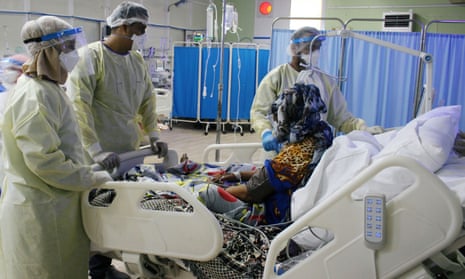At least 97 Yemeni healthcare workers have died from Covid-19 as the disease ravages the war-torn country, according to a report that gives an insight into the true scale of Yemen’s poorly documented outbreak.
Yemen, already suffering from a five-year war that has caused the world’s worst humanitarian crisis, has proved uniquely vulnerable to the coronavirus pandemic, according to data published by the medical charity MedGlobal on Thursday.
Local doctors and medical students tracked their colleagues’ deaths from Covid-like symptoms in order to figure out the impact of the virus in a country where testing facilities are almost non-existent and data from both government and rebel-held areas is unreliable.
Yemen’s official total number of cases is 1,610, with 446 deaths, so the high number of healthcare worker casualties outlined by the report suggests the true caseload and mortality figure is far higher. For comparison, in badly hit Italy, where 245,0362 people have caught the virus, 35,073 people have died, including about 100 doctors. Yemen currently has a 27% mortality rate from the disease – more than five times the global average.
In a country where half of all medical facilities are out of action, and aid funding shortfalls are exacerbating the existing malnutrition and cholera crises, the loss of just one medical professional has a devastating exponential effect. About 18% of the country’s 333 districts already have no doctors.
Dr Nahla Arishi, a paediatrician working on the emergency coronavirus response in the southern city of Aden, contracted the virus herself in May but recovered.
“We have lost our best colleagues, people who can’t be replaced easily,” she said. “Coronavirus is also killing the morale of medical staff.”
Dr Yassin Abdul Warith, one of Yemen’s leading epidemiologists, Dr Salem Saleh Muhammad al-Omari, the head of internal medicine at the University of Aden, and Dr Arif Ahmed Ali, a public health specialist, are among the doctors who have died.
The loss of five gynaecologists and midwives will also have a disastrous impact in a country where one in every 260 women die during pregnancy or childbirth.
The governorate with the most health workers who have died from Covid-19 is Sana’a, with at least 39% of the total, although the Houthi rebels who control the area have not recorded a single case of the virus.
It is also feared the Covid-19 outbreak is drawing attention and resources away from other aspects of Yemen’s wider health emergency.
Hunger is on the rise again, with a UN analysis released on Wednesday suggesting the number of Yemenis facing high levels of acute food insecurity is forecast to increase from 2 million to 3.2 million over the next six months – about 40% of the population.
“Diseases such as malnutrition and cholera and lack of treatment for non-communicable illnesses such as heart disease and cancer are still killing more people than Covid-19,” said Dr Zaher Sahloul, MedGlobal’s president.
“Things we don’t necessarily think about in the UK or US as needs, very basic levels of equipment, technology maintenance and actually training medical professionals on how to use these resources are huge problems in Yemen.”
MedGlobal is calling for NGOs and UN agencies to provide Yemen’s embattled healthcare workers with the protective equipment necessary to do their jobs safely and provide training for medical staff on how to cope with limited resources.
“This is the time for all parties to the conflict to take steps to end the hostilities and for the international community to step up,” Sahloul said. “If not now, then when?”
